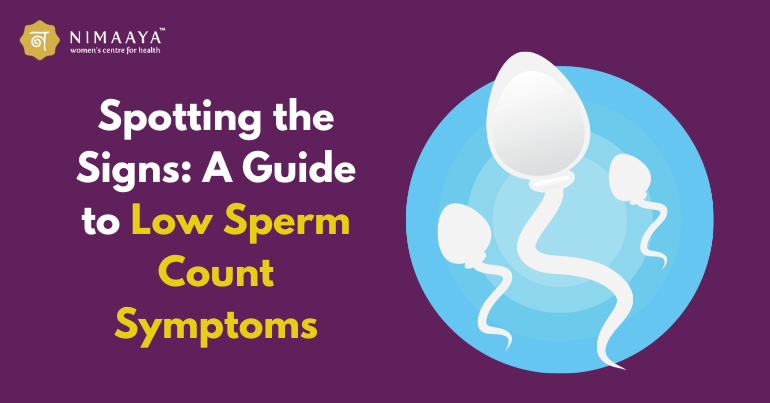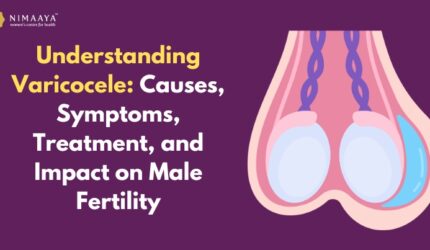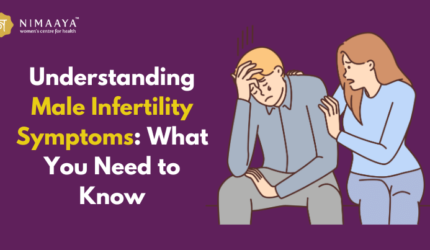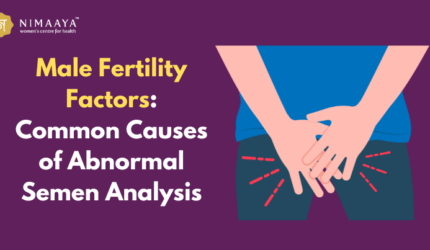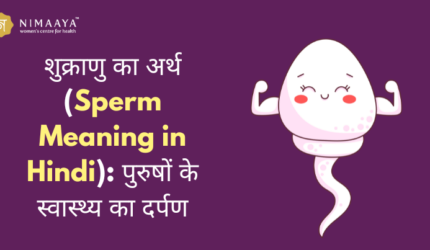Introduction
Every couple dreams of starting a family, but sometimes, conception doesn’t come as easily as expected. For men, a lower sperm count can be a significant barrier to achieving this dream. Understanding low sperm count symptoms is crucial for timely intervention and effective treatment. In this article, we’ll delve into the signs that may indicate a lower sperm count, shedding light on male infertility and the potential underlying medical conditions. Let’s navigate through the subtle indicators that could signal a need for attention, care, and perhaps, a visit to the Nimaaya IVF Center, renowned for its expertise in addressing male infertility under the guidance of the best gynecologist in Surat.
Why is it Important to Know the Low Sperm Count Symptoms?
It’s crucial to recognize the symptoms or signs of low sperm count because early detection can prompt timely intervention and treatment. By being aware of potential indicators such as difficulty conceiving, changes in libido, or hormonal imbalances, individuals can seek medical advice promptly, leading to a better chance of addressing underlying issues that may be impacting fertility.
Additionally, understanding these symptoms allows individuals to make informed decisions about their reproductive health and seek support from healthcare professionals who can provide guidance and assistance in managing low sperm count effectively. Ultimately, early recognition of lower sperm count symptoms can lead to improved fertility outcomes and better overall reproductive health.
Understanding 5 Major Causes of Low Sperm Count

Low sperm count, medically termed oligospermia, can significantly impact a man’s fertility and his ability to conceive with his partner. While fertility issues can be complex, understanding the common causes of low sperm count is crucial for addressing and potentially reversing this condition. Here are five major factors contributing to low sperm count:
❧ Lifestyle Factors:
Lifestyle choices play a significant role in sperm production. Factors such as smoking, excessive alcohol consumption, drug abuse, and obesity can all contribute to a decrease in sperm count. These habits can disrupt hormone levels and impair sperm production in the testes.
❧ Environmental Factors:
Pollutants in the environment can negatively impact sperm health. Exposure to toxins like pesticides, heavy metals, and chemicals in everyday products can interfere with sperm production and function. Certain occupations, such as those involving prolonged exposure to chemicals or radiation, may also increase the risk of low sperm count.
❧ Medical Conditions:
Various medical conditions can impact sperm production and fertility. Hormonal disorders, such as hypogonadism, can disrupt the hormonal balance necessary for sperm production. Additionally, conditions like infections, varicoceles (enlarged veins within the scrotum), and genetic disorders may contribute to low sperm count.
❧ Heat Exposure:
High temperatures within the testes can hinder the process of sperm generation. Activities that increase scrotal temperature, such as prolonged sitting, wearing tight clothing, or frequent use of saunas or hot tubs, can negatively affect sperm quality and quantity. Maintaining proper testicular temperature is crucial for optimal sperm production.
❧ Emotional Stress:
Psychological factors, including stress and anxiety, can impact male fertility. Chronic stress can lead to hormonal imbalances, which may affect sperm production and quality. High stress levels can also contribute to unhealthy lifestyle habits that further exacerbate low sperm count.
Understanding the causes of low sperm count is essential for both diagnosis and treatment. By addressing lifestyle factors, minimizing exposure to environmental toxins, seeking medical evaluation for underlying conditions, avoiding heat exposure to the testes, and managing stress levels, men can potentially improve their sperm count and overall fertility. Consulting with a healthcare professional is crucial for personalized guidance and treatment options tailored to individual needs.
Exploring Symptoms Associated with Low Sperm Count in Men
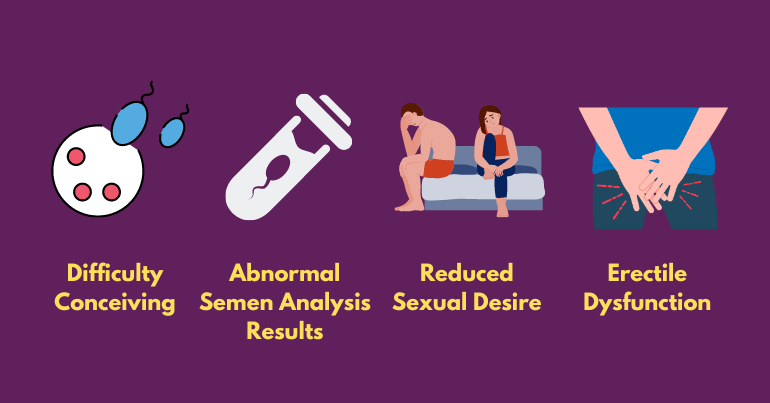
Embarking on an exploration of the low sperm count symptoms in men unveils a multifaceted aspect of male reproductive health. Understanding these symptoms of low sperm count is paramount, as they can serve as crucial indicators of underlying fertility issues or potential health concerns. From challenges in conception to physical manifestations and potential implications on overall well-being, delving into this topic sheds light on the complexities of male fertility and underscores the importance of early detection and intervention.
① Difficulty Conceiving:
One of the primary low sperm count symptoms is difficulty in conceiving a child despite regular, unprotected intercourse for an extended period, typically one year or more. This struggle to conceive despite persistent efforts can be emotionally taxing for couples and may prompt them to seek medical advice. It underscores the need for thorough evaluation to identify potential causes and appropriate treatment strategies. Additionally, addressing this challenge early on can alleviate stress and anxiety, fostering a more positive journey toward parenthood. Understanding the correlation between less sperm count and conception difficulties is essential in guiding couples toward effective fertility solutions.
② Abnormal Semen Analysis Results:
A semen analysis is a crucial test to assess fertility. Low sperm count symptoms are indicated if the semen analysis shows a sperm count below 15 million sperm per milliliter of semen. An abnormal semen analysis result is often the initial signal prompting further investigation into male fertility.
This examination, which assesses a number of factors such as sperm count, motility, and morphology, offers insightful information on reproductive health. Specifically, a sperm count below 15 million sperm per milliliter of semen is indicative of a lower sperm count, a condition that can significantly impact fertility outcomes. Therefore, interpreting semen analysis results accurately is pivotal in diagnosing and addressing potential concerns regarding male fertility.
③ Reduced Sexual Desire:
Some men with lower sperm counts may experience a decrease in libido or sexual desire, though various other factors can also influence this. Furthermore, reduced sexual desire often intertwines with a lower sperm count, presenting a nuanced aspect of male reproductive health. While it’s a common symptom, it’s essential to recognize that decreased libido can stem from a myriad of factors beyond just sperm count. Psychological factors, stress, relationship issues, hormonal imbalances, and underlying health conditions can all contribute to changes in sexual desire. Thus, a comprehensive assessment is necessary to discern the precise cause and implement tailored interventions effectively.
④ Erectile Dysfunction:
While not always directly related, erectile dysfunction (difficulty achieving or maintaining an erection) can sometimes be associated with a lower sperm count, as both may be influenced by underlying health issues. Erectile dysfunction, characterized by difficulty achieving or maintaining an erection, can often be intertwined with concerns regarding low sperm count symptoms. Although not always directly correlated, both conditions may share underlying health factors such as hormonal imbalances or vascular issues. Addressing erectile dysfunction alongside assessing sperm count can provide a more comprehensive approach to male reproductive health. Therefore, it’s imperative to consider these interconnected aspects when evaluating and managing fertility concerns in men.
⑤ Pain or Swelling in the Testicle Area:
In some cases, less sperm count can be accompanied by physical symptoms such as pain or swelling in the testicle area. This could indicate a potential underlying issue affecting sperm production. Men experiencing low sperm count symptoms may also encounter discomfort such as pain or swelling in the testicle area, prompting further investigation into potential underlying causes.
While these symptoms may vary in severity, they shouldn’t be overlooked, as they could signify conditions such as varicocele, infections, or hormonal imbalances. Seeking medical attention for proper evaluation and diagnosis is crucial in addressing these concerns and initiating appropriate treatment. By recognizing and addressing these physical manifestations, individuals can take proactive steps toward optimizing their reproductive health and overall well-being.
⑥ Changes in Hair Growth or Physical Appearance:
Hormonal imbalances associated with a lower sperm count might manifest in changes in body hair growth patterns, such as decreased facial or body hair, or changes in physical appearance like breast enlargement (gynecomastia). These changes in hair growth or physical appearance serve as visible cues that merit attention. For instance, diminished facial or body hair can signal underlying hormonal shifts that affect reproductive health.
Additionally, the occurrence of gynecomastia, characterized by breast enlargement, underscores the intricate interplay between hormonal imbalances and male fertility. less sperm countRecognizing and addressing these outward signs can lead to a deeper understanding of potential underlying factors lowerributing to and facilitating targeted treatment approaches.
⑦ Potential Underlying Medical Conditions:
A lower sperm count can be a symptom of underlying medical conditions such as hormonal imbalances, genetic disorders, infections, or anatomical issues like varicocele (enlarged veins within the scrotum). Seeking medical evaluation can help identify and address these underlying causes. Exploring further, low sperm count symptoms often serve as a signpost for various underlying medical conditions.
Hormonal imbalances, including disruptions in testosterone levels, can significantly impact sperm production. Genetic disorders such as Klinefelter syndrome or Y chromosome deletions may also contribute to reduced sperm count. Additionally, infections such as sexually transmitted infections or reproductive tract infections can impair sperm production or function. Varicocele, characterized by enlarged veins in the scrotum, can obstruct blood flow and heat the testicles, negatively impacting sperm production. Seeking timely medical evaluation is essential to identify and address these underlying causes effectively.
It’s important to note that experiencing one or more of these low sperm count symptoms doesn’t necessarily mean a man has less sperm count, as they can also be indicative of other health issues. Consulting with a healthcare professional for proper diagnosis and treatment is crucial.
Tips for Improving Sperm Count
Improving sperm count often involves lifestyle adjustments and adopting healthier habits. Firstly, maintaining a balanced diet rich in fruits, vegetables, whole grains, and lean proteins can provide essential nutrients like zinc, folate, and antioxidants, which support sperm production. Regular exercise can help manage weight and reduce stress, both of which can positively impact sperm count.
Avoiding excessive alcohol consumption and refraining from smoking are crucial, as they can impair sperm quality and quantity. Managing stress through relaxation techniques like meditation or yoga may also benefit sperm count. Finally, maintaining a healthy weight and avoiding exposure to environmental toxins, such as pesticides and certain chemicals, can further support optimal sperm production and overall reproductive health.
Conclusion:-
Recognizing the signs and low sperm count symptoms is crucial for timely intervention and effective management of male infertility. Whether it’s difficulty conceiving, abnormal semen analysis results, or underlying medical conditions, seeking prompt medical attention is essential for couples aspiring to start a family. At Nimaaya IVF Center, our dedicated team, led by the Best IVF Center in Surat, is committed to providing compassionate care and personalized treatment options to help couples overcome infertility challenges and fulfill their dream of parenthood. Don’t let low sperm count symptoms stand in the way of your journey to parenthood; take the first step towards a brighter future today.

